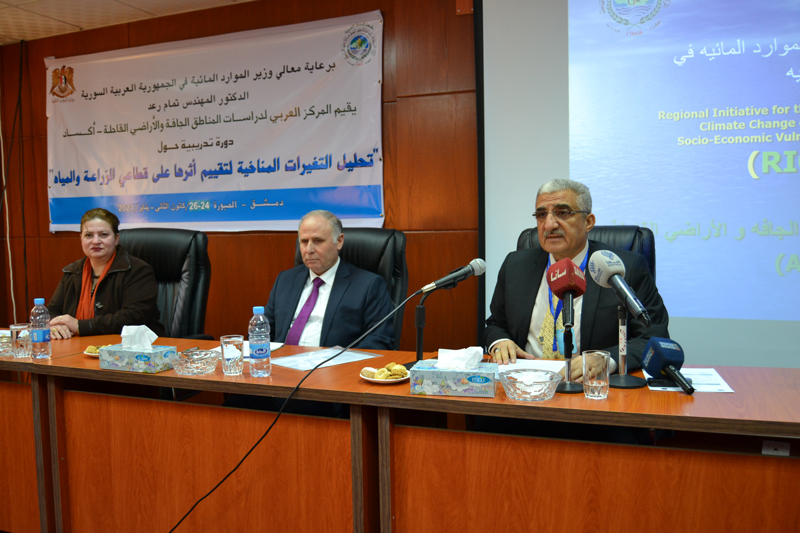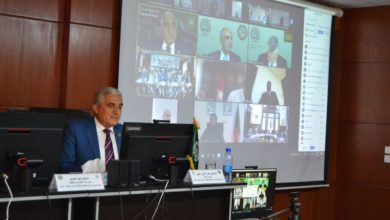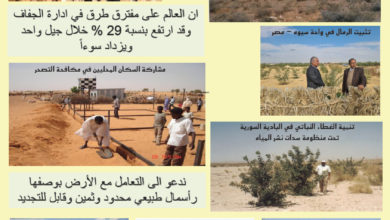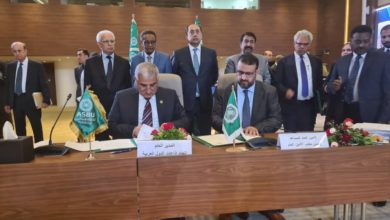Climate change analysis/ training course at ACSAD
At the headquarters of the Arab Center for the Studies of Arid Zones and Drylands (ACSAD) in Damascus, the activities of training course in the field of “Climate Change Analysis to Evaluate Its Impact on Agriculture and Water Sectors” was launched today under the patronage of His Excellency the Minister of Water Resources in the Syrian Arab Republic, Dr. eng. Tamam Raad.
In an address, Minister Raad, in the presence of the Syndicate of the Syrian Agricultural Engineers, Dr. Rama Aziz, and a large turnout of Syrian and Arab experts, stressed the importance of cooperation between the Ministry and ACSAD Organisation in the scientific and practical areas of common interest, commending the important activities and scientific results implemented by ACSAD, particularly at this stage.
He drew attention to the importance of the training course in strengthening and upgrading the cadres competence of Syrian and Arab scientific and technical personnel working in the water and agricultural sectors, which would benefit the sustainable development processes and projects in Syria and the Arab region.
Dr. Raad explained that ACSAD implemented various projects for the benefit of the agriculture and water sectors in the Syrian Arab Republic; and has completed the construction of 15 mathematical models, covering all Syrian hydrological basins, with a view to identifying promising areas of the groundwater and safe dragging, ensuring their sustainability, in addition to examining the impact of future use scenarios and climate change on them, the most recent of which was the mathematical model for the basins of Al- Furat, Al-Assi, and the coastal.
For his part, the Director-General, Dr. Nasr Edin Obaid, said that ACSAD is holding this course in the task it has been working honestly to accomplish since its inception as an Arab experience house serving the common Arab development objectives, that confirmed by The Arab Strategy for Water Security in the Arab Region, in order to meet future challenges and requirements of sustainable development (2020-2030) and its implementation plan
In this context, Dr. Obaid pointed out that ACSAD has prioritized the issue of climate change and adaptation over the past ten years and has carried out numerous projects and studies in this area.
He noted that ACSAD had used hydrological modeling to study the effects of these changes on the available water resources in the Arab region, in particular concerning main rivers originating beyond the borders of the Arab region, in cooperation with FAO and the German Agency for International Cooperation (GIZ), it had studied the impact of climate change on the productivity and water requirements of strategic agricultural crops.
The Director-General of the Arab Centre (ACSAD), Dr. Nasr Edin Obid, noted that ACSAD had done so and focused on developing adaptation methods to the effects of climate change. It had implemented the project” Akwam,” funded by the German Agency for International Cooperation (GIZ), which covered the entire Arab region.
Dr. Obaid expressed his appreciation to the Headquarters country, the Syrian Arab Republic, for the unlimited support it continues to provide to ACSAD, particularly in its years of crisis.
ACSAD holds a three-day course for the benefit of 18 engineers from the Ministries of Water Resources, Agriculture and Agrarian Reform of the Syrian Arab Republic, aims to build the capacities of the participating cadres in dealing with climate change data, both those available in the global databases and those developed by ACSAD and ESCWA through the “RECAR” project. At the end of the course, trainees will be able to identify the expected climatic changes of different scenarios and prepare the changes in temperature and maps daily, monthly, seasonal, and rainfall at the national and regional levels.
Also, the trainers will be able to extract the climate data from global and Arab platforms using geographic information systems (GIS), prepare daily time series of climate change data for any specific location to be used as inputs for studying the impact of climate change on water resources and agricultural crop production, and to calculate extreme climate events (heat, rain), familiarizing climate change adaptation measures to reduce their impact on agriculture and water sectors, and how to evaluate the impact of climate change on agriculture and water sectors.
A selected group with high competence at the Arab and international levels and specialist experts of ACSAD is conducting the applied, practical, and scientific training.




